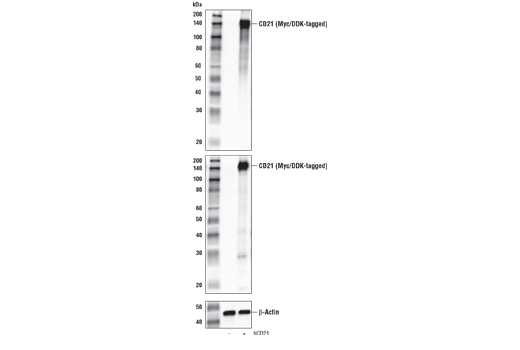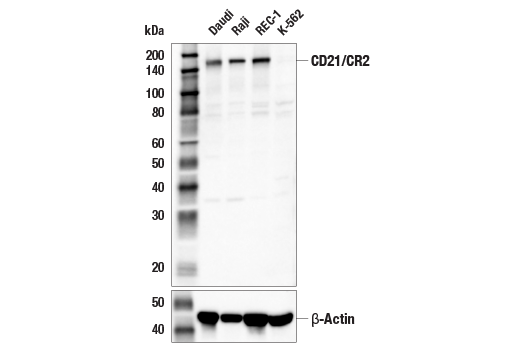WB
H
Endogenous
150
Rabbit
#P20023
1380
Product Information
Product Usage Information
| Application | Dilution |
|---|---|
| Western Blotting | 1:1000 |
Storage
Specificity / Sensitivity
Species Reactivity:
Human
Source / Purification
Polyclonal antibodies are produced by immunizing animals with a synthetic peptide corresponding to residues surrounding Asp430 of human CD21/CR2 protein. Antibodies are purified by protein A and peptide affinity chromatography.
Background
Complement receptor type 2 (CD21/CR2) is a type 1 transmembrane glycoprotein whose expression is largely restricted to B lymphocytes and follicular dendritic cells (1,2). Research studies have shown that CD21/CR2 functions to bind the complement fragments iC3b, C3dg, and C3d, which function to activate the alternative complement pathway and MAC formation (3,4). In addition to its function as a complement receptor, CD21/CR2 also functions as the B lymphocyte receptor for Epstein-Barr virus (5) and interferon alpha (6). Research studies have also shown that CD21/CR2 participates in B cell activation, proliferation, and protection from apoptosis through its association with components of the B cell coreceptor signaling complex such as CD19 and CD21 (7-9).
- Nadler, L.M. et al. (1981) J Immunol 126, 1941-7.
- Reynes, M. et al. (1985) J Immunol 135, 2687-94.
- Weis, J.J. et al. (1984) Proc Natl Acad Sci U S A 81, 881-5.
- Nielsen, C.H. et al. (2001) Immunology 104, 418-22.
- Fingeroth, J.D. et al. (1984) Proc Natl Acad Sci U S A 81, 4510-4.
- Asokan, R. et al. (2006) J Immunol 177, 383-94.
- Tedder, T.F. et al. (1994) Immunol Today 15, 437-42.
- Fearon, D.T. and Carter, R.H. (1995) Annu Rev Immunol 13, 127-49.
- Mongini, P.K. et al. (2003) J Immunol 171, 5244-54.
Species Reactivity
Species reactivity is determined by testing in at least one approved application (e.g., western blot).
Western Blot Buffer
IMPORTANT: For western blots, incubate membrane with diluted primary antibody in 5% w/v BSA, 1X TBS, 0.1% Tween® 20 at 4°C with gentle shaking, overnight.
Applications Key
WB: Western Blotting
Cross-Reactivity Key
H: human M: mouse R: rat Hm: hamster Mk: monkey Vir: virus Mi: mink C: chicken Dm: D. melanogaster X: Xenopus Z: zebrafish B: bovine Dg: dog Pg: pig Sc: S. cerevisiae Ce: C. elegans Hr: horse GP: Guinea Pig Rab: rabbit All: all species expected
Trademarks and Patents
Limited Uses
Except as otherwise expressly agreed in a writing signed by a legally authorized representative of CST, the following terms apply to Products provided by CST, its affiliates or its distributors. Any Customer's terms and conditions that are in addition to, or different from, those contained herein, unless separately accepted in writing by a legally authorized representative of CST, are rejected and are of no force or effect.
Products are labeled with For Research Use Only or a similar labeling statement and have not been approved, cleared, or licensed by the FDA or other regulatory foreign or domestic entity, for any purpose. Customer shall not use any Product for any diagnostic or therapeutic purpose, or otherwise in any manner that conflicts with its labeling statement. Products sold or licensed by CST are provided for Customer as the end-user and solely for research and development uses. Any use of Product for diagnostic, prophylactic or therapeutic purposes, or any purchase of Product for resale (alone or as a component) or other commercial purpose, requires a separate license from CST. Customer shall (a) not sell, license, loan, donate or otherwise transfer or make available any Product to any third party, whether alone or in combination with other materials, or use the Products to manufacture any commercial products, (b) not copy, modify, reverse engineer, decompile, disassemble or otherwise attempt to discover the underlying structure or technology of the Products, or use the Products for the purpose of developing any products or services that would compete with CST products or services, (c) not alter or remove from the Products any trademarks, trade names, logos, patent or copyright notices or markings, (d) use the Products solely in accordance with CST Product Terms of Sale and any applicable documentation, and (e) comply with any license, terms of service or similar agreement with respect to any third party products or services used by Customer in connection with the Products.

